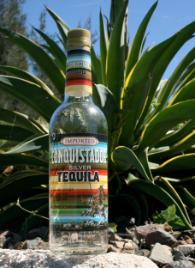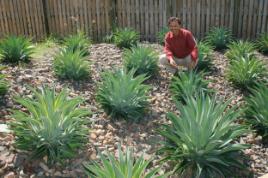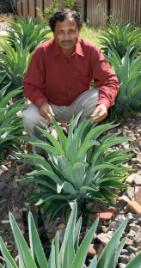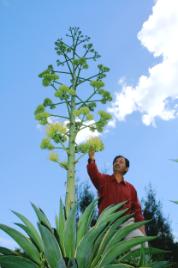'Suck and see' if tequila can fuel more than just parties?
Published on 27 April, 2009
Tequila, a desert plant which is related to the species shown below, has fuelled many a big night out and the next-morning headaches too! But now researchers have decided to lick-sip-suck and see just what potential there is to create biofuel (ethanol) out of the 'tequila plant'.
Botanically known as Agave tequilana, the plant which produces tequila is one of the most water-efficient in the world.
CQUniversity researcher Associate Professor Nanjappa Ashwath* has agreed to help Agave grower Don Chambers of AUSAGAVE who plans to establish field trials to demonstrate the plant's potential to serve as alternative raw materials for ethanol production units located around sugar mills. You can LINK here to a video presentation
"We have an excellent opportunity here, as Agave Tequilana can be harvested and supplied to mills during the 6 months of the year when sugarcane is not available" he said.
"Agave can grow well in the CQ region, producing up to 50 tonnes of ethanol feedstock per hectare per year. It is very easy to cultivate, taxing very little on resources as it stays in ground for up to 5 years once established."
Assoc Prof Ashwath said there had been no research in Australia, but Don Chambers has propagated about 10,000 plants by tissue culture so that they can be trialed around sugar mills of Queensland.

Tequila, the most popular product of Agave tequilana
"We could commence field trials to optimise spacing and fertilizer requirements, select high yielding cultivars and to develop an appropriate harvesting technology," he said.
"Local sugarcane farmers have shown interest in this idea and the Energy Enterprises Australia is willing to collaborate."
Assoc Prof Ashwath said he hoped to gain enough support to progress this opportunity as an "innovative approach to find a solution to a local problem".
He said that Australia provided a perfect setting for agave production because of its large areas, limited water resources and plenty of sunlight.
For this reason, agave would not have to displace any existing food or biofuel crops as it can be grown in areas that are not used for crop production.

The plant can be grown without displacing other crops
* Associate Professor Ashwath was among the only 20 candidates in the world to gain a 2008 Rotary Teaching Scholarship, which enabled his 3-month tour of India (from Nov 08 to Jan 09) to show how Australian plants can help remediate degraded land and produce essential requirements of life such as animal feed, fuel wood and biofuels.



